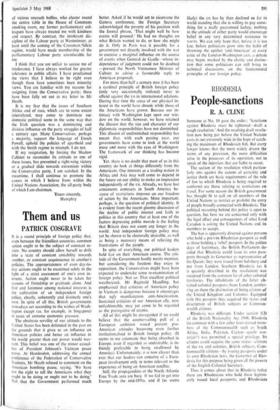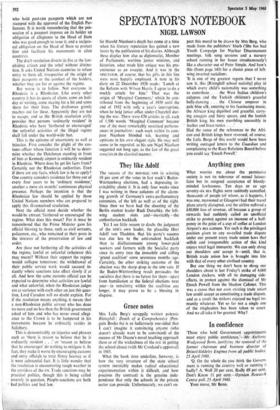People-sanctions
RHODESIA R. A. CLINE
Someone at No. 10 gave the order: 'Sanctions against Rhodesia must be tightened—draft a tough resolution.' And the resulting draft resolu- tion now being put before the United Nations casts its net extremely wide in the hope of catch- ing the maximum of Rhodesian fish. But every lawyer knows that the more widely drawn the terms of any provision, the more difficulties arise in the processes of its operation, not to speak of the injustices that are liable to occur.
The section of the resolution which particu- larly sins against the canons of certainty and justice (both are basic requirements of the rule of law to which Rhodesia is being required to conform) are those relating to restrictions on travel. For some reason the British government has thought fit to call on all members of the United Nations to restrict or prohibit the entry of people broadly connected with Rhodesia. The political reasoning behind this policy is open to question, but here we are concerned only with the legal effect and consequences of what Lord Caradon is asking the United Nations and its members to accept.
The ban is apparently directed against persons who hold a pre-uot Rhodesian passport as well as those holding a 'rebel' passport. In the golden days of legitimacy, the British Parliament de- cided that Rhodesia could issue its own pass- ports through its Governor as representative of the Queen; they were issued from Salisbury and not from London. Southern Rhodesia (as it is quaintly described in the resolution) was excepted from the common lot of other colonial territories. The inhabitants of the latter ob- tained colonial passports from London, confer- ring on them the distinction of being citizens of the United Kingdom and Colonies. Equipped with this passport they acquired the status and description of British subjects or Common- wealth citizens.
Rhodesia was different. Under section 1(3) of the British Nationality Act 1948, Rhodesia (in common with a few other four-starred mem- bers of the Commonwealth such as South Africa, India, Pakistan, Ceylon—quelle nos- talgie!) was permitted a special privilege. Its citizens could acquire the same status—citizens of the UK and colonies, British subjects, Com- monwealth citizens—by issuing passports under its own Rhodesian laws, the Governor of Rho- desia for this purpose being given all the powers of the English Colonial Secretary.
Thus it comes about that in Rhodesia today there are Rhodesians who hold these legitim- ately issued local passports, and Rhodesians who hold post-opt passports which are not stamped with the approval of the English Par- liament. It is worth remembering that the pos- session of a passport imposes on its holder an obligation of allegiance to the Head of State who was good enough to issue it, and a recipro- cal obligation on the Head of State to protect him and facilitate his movements in alien countries.
The draft resolution directs its fire at the law- abiding citizen and the rebel without distinc- tion. It asks United Nations countries to refuse entry to them all, irrespective of the origin of their passports or the conduct of the holders, whether they are for or against the regime.
But worse is to follow. Not everyone in Rhodesia is a Rhodesian. Like every other country it has its quota of aliens, some on holi- day or visiting, some staying for a bit and some there for their lives. The draftsman grimly reaches out for these. Apparently they are not to escape, and so the British resolution airily provides that persons 'ordinarily resident' in Rhodesia who have 'furthered or encouraged' the unlawful activities -of the illegal regime shall fall under the world-wide ban.
This is the epitome of uncertainty as well as injustice. First consider the plight of the cus- toms officer whose function it will be to deter- mine whether the Dutchman standing in front of him at Kennedy airport is ordinarily resident in.Rhodesia. Where does he get his facts from? Certainly not the Rhodesian authorities. Even if there are any facts, which law is he to apply? One country considers residence for three out of every four years to be 'ordinary residence,' another a mere six months' continuous physical presence. Perhaps the intention is that the Rhodesian law should be applied by those United Nations members who are prepared to apply this ill-conceived resolution.
Next the official must decide whether the would-be entrant 'furthered or encouraged' the regime. What does this mean? For it must be remembered that the Prime Minister gave his official blessing to those, such as civil servants, policemen, etc., who remained at their posts in the interests of the preservation of law and order.
Are these not furthering all the activities of the regime, lawful or unlawful (whatever this may mean)? Without their support the -regime would collapse tomorrow; the withdrawal of their public service work would succeed in- stantly' where sanctions take effect slowly if at all. And how the same customs official can be expected to determine what activities are lawful and what unlawful, when the Rhodesian judges are at variance with each other on just this ques- tion, Lord Caradon will no doubt explain. For- if the resolution means anything, it means that a non-Rhodesian public servant who has done no more and no less than the British government asked of him and who has never owed allegi- ance to the Crown is to be hampered in his movements because he ordinarily resides in Salisbury.
This is demonstrably an injustice and phrases such as 'there is reason to believe that he is ordinarily resident . . .' or 'reason to believe that he encourages' do nothing to mitigate it. In fact, they make it worse by encouraging customs and entry officials to treat flimsy hearsay as if it were substantial fact. It is little wonder that the resolution is encountering rough weather in the corridors of the UN. Trade sanctions may be practical politics, though this is being called severely in question. People-sanctions are both - bad -politics and bad law.







































 Previous page
Previous page